THE GREEN LINE
ORIGINAL STORY
Neighbourhood organizing: The Hyperlocal Heartbeat of Toronto’s Pro-Palestinian Movement
From Davenport to Church-Wellesley and beyond, neighbourhood groups are creating a replicable model for organizing protests, hosting community solidarity events and advocating for policy change.
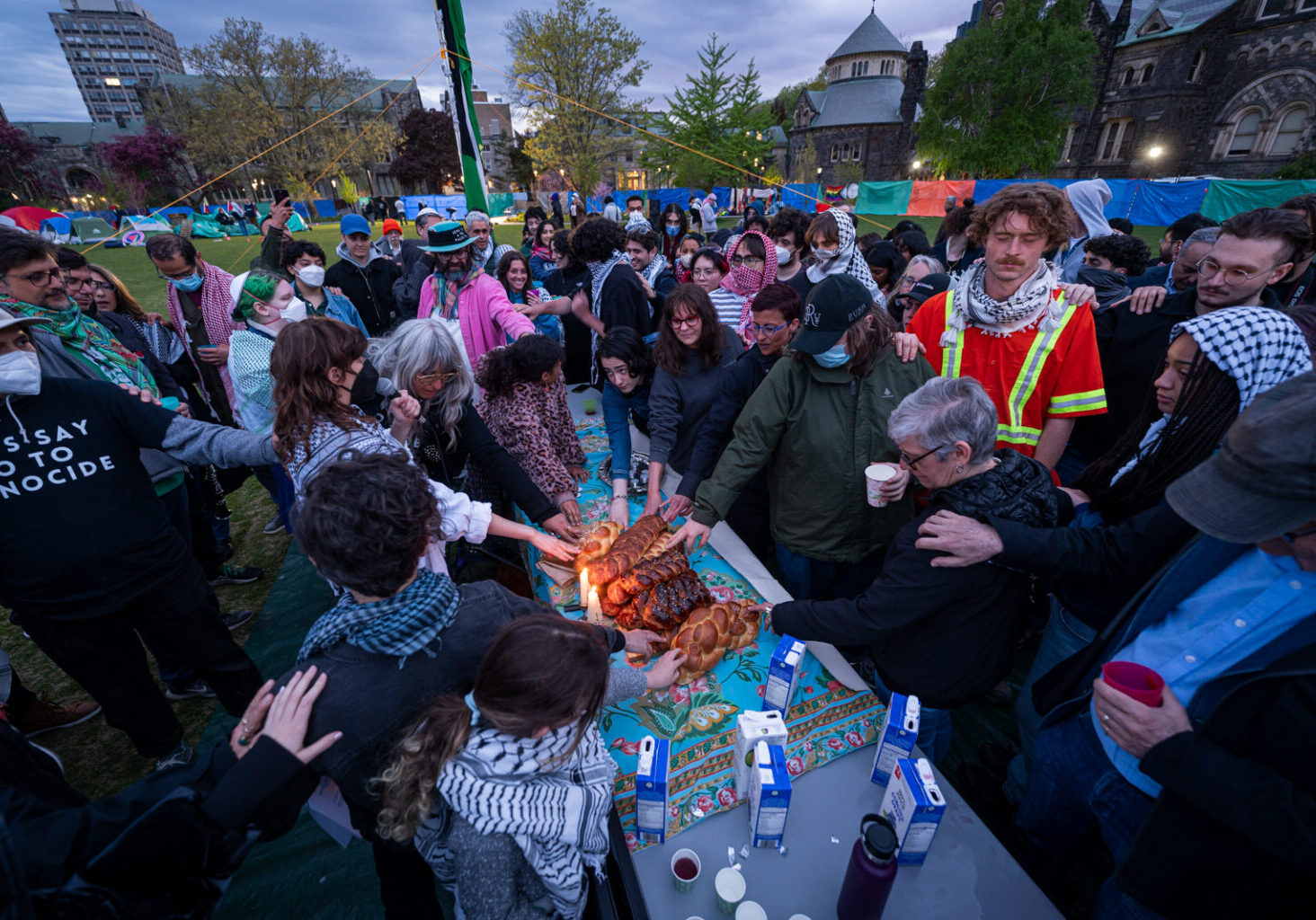
On May 10, 2024, IfNotNow Toronto held a Shabbat at the student encampment at University of Toronto’s St. George Campus in downtown Toronto.

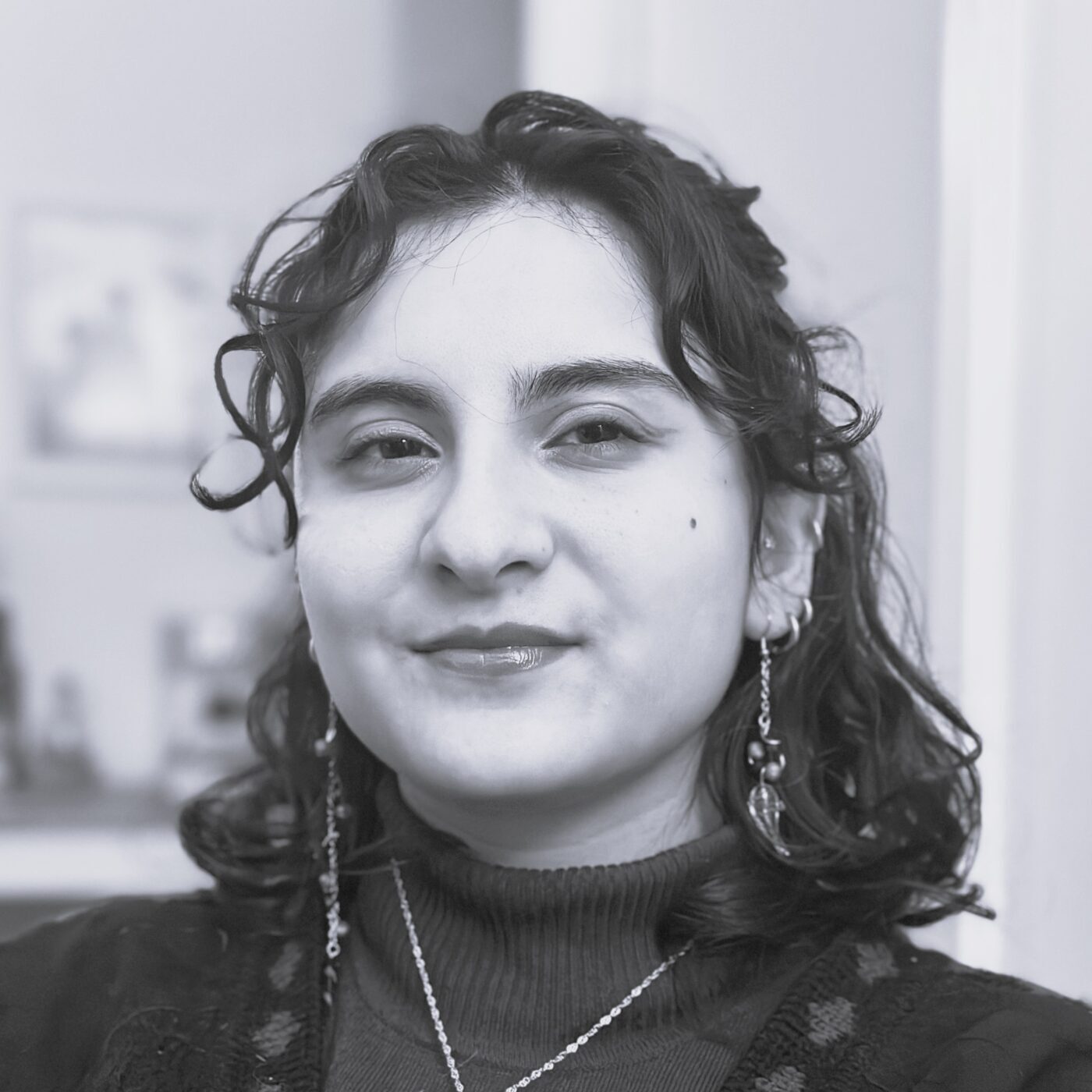
YARA EL MURR
Award-winning journalist with experience covering the environment, migration and labour. Lover of cats, crafts and kibbeh. Hailing from Lebanon, living in Moss Park.
August 6, 2024
On a sunny Saturday morning in July, a couple dozen pro-Palestinian activists from different corners of Toronto set out to break bread and brainstorm the best course of action for their neighbourhood groups.
One by one, community organizers filtered through glass doors into the party room of a condo in Church-Wellesley. Their first stop was a kitchen island where they picked up keffiyeh-patterned pins and name tags, and filled plates with baked goods, fruits, cheeses and zaatar, as old friends caught up and strangers got acquainted.
Each had been organizing around the electoral constituencies in which they live — Etobicoke, Davenport, Parkdale, Spadina-Fort York, Toronto Centre, Toronto-St. Paul’s, University-Rosedale and more — under one logo and name variants under the umbrella: “Toronto for Palestine directory.” The shared goal? Pushing their local MPs to acknowledge Israel’s attacks on Gaza, which the United Nations and the International Court of Justice have deemed a plausible genocide, and to vote for a permanent ceasefire and an arms embargo in Canada’s federal parliament.
After nine months of organizing, they’d come together to share lessons learned, and to plan future actions. As community members sat in a circle, they bounced around and pushed back against many ideas, from diversifying political pressure tactics ahead of the 2025 federal election, to building a local BDS (Boycott, Divest, Sanction) movement.
Everyone agreed on the main direction: the necessity of building a consistent and sustainable mass movement based on solidarity across causes. As one participant put it: They’re fighting the Palestinian cause for what it represents globally, and need to touch on other issues to pull in more Torontonians.
The “Toronto for Palestine directory” groups are some of many organizations that have been mobilising locally in response to Israel’s constant bombardment of Palestinians in Gaza. Frustrated by Canada’s arms exports (outlined by disarmament think tank Project Ploughshares) and political support for Israel, Toronto activists have come up with hyperlocal ways to protest.
Just last month, on June 8, 2024, thousands of Torontonians marched at University Avenue and Queen Street West to protest Canada’s role in Israel’s assault on Gaza. Signs and chants called for one demand to the federal government: an arms embargo.
Meanwhile, a few streets north at the University of Toronto’s St. George campus, several hundred protesting students and faculty stood their ground in an encampment they called “The People’s Circle for Palestine.” Their demand was more specific: that the university divests any investments that provide military goods or services to Israel.
That same afternoon, the grassroots neighbourhood group Davenport for Palestine hosted a family friendly picnic in Earlscourt Park to celebrate Palestinian heritage and joy. Parents and children gathered to eat pizza and watermelons, and to listen to live performances by Palestinian artists Roula Said and Halal Bae.
From marching in demonstrations throughout downtown (which, full disclosure, I have participated in) and blocking a freight line on the west end, to programming a community film festival and organizing market fundraisers, the main focus is saving Palestinian lives in Gaza. But these actions are also helping people in Toronto build networks where community members can heal, and connect with like-minded individuals.
“These past months have been very difficult for Palestinians, as we relive the Nakba and ethnic cleansing of our people. The genocide of Palestinians in Gaza has triggered collective generational trauma. The gaslighting by Canadian media and politicians made bearing witness even more difficult to endure,” S.H.A, a Palestinian-Canadian filmmaker, who requested anonymity for fear of professional repercussions, told The Green Line.
“A lot of people — even non-Palestinians — are saying, ‘If it wasn't for community organizing in solidarity with Palestinians, I would lose my fucking mind’.”
S.H.A. has lived in Toronto for 13 years, but over the past few months, she says her relationship to the city has changed dramatically.
“I always felt I'm on the margins culturally, being an immigrant from the Arab world. But now, I do see myself in the city, specifically in these counter-spaces and spaces of community,” she explains. “It’s been amazing to be part of this grassroots movement in the city.”
“I’ve never seen people in Toronto be so politically and civically engaged.”
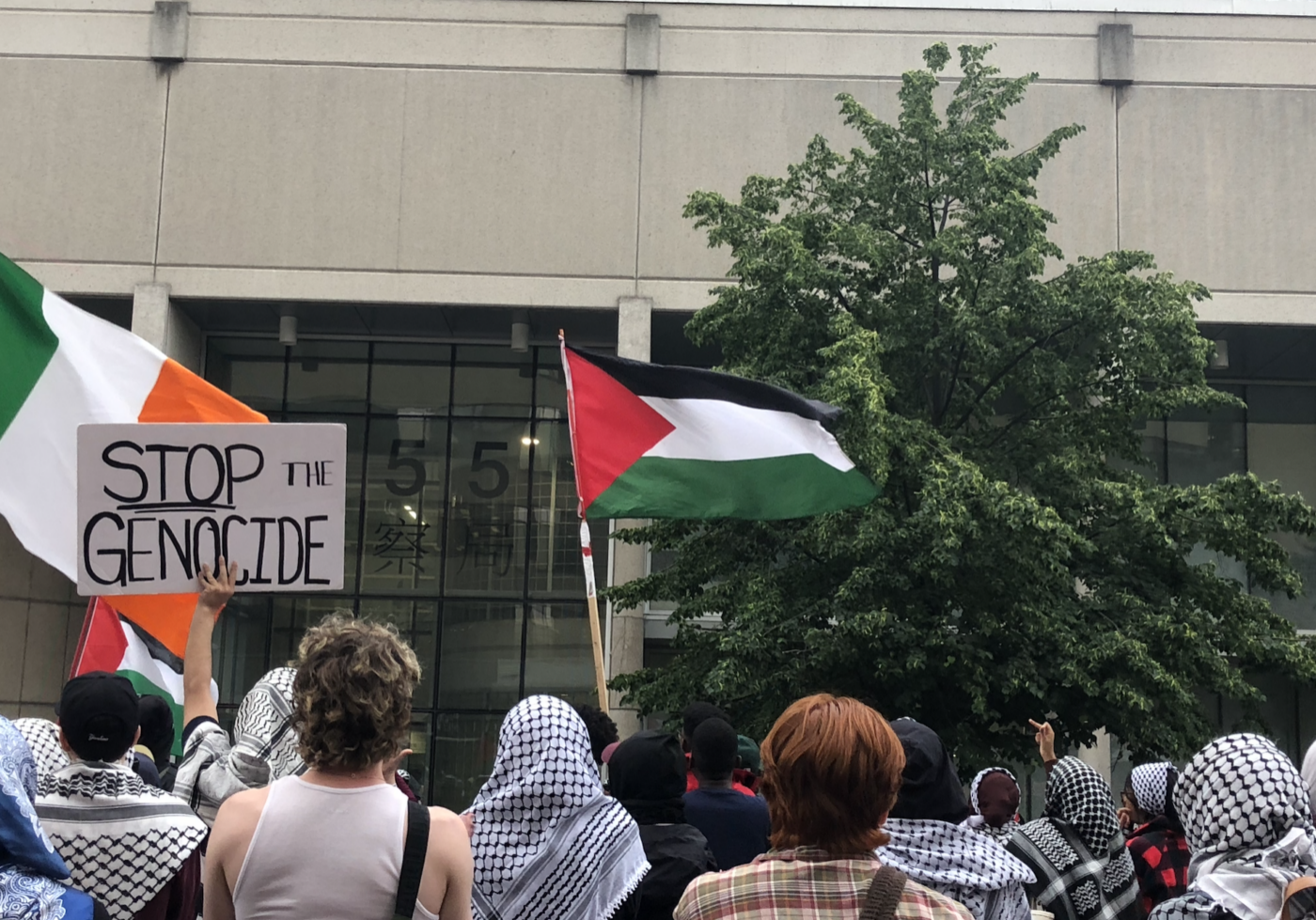
Pro-palestinian activists sit-in facing the Toronto Police Service 52 Division after officers arrested protesters on June 8, 2024.

ORGANIZING AROUND ELECTORAL RIDINGS
Since October 2023, the “Toronto for Palestine” neighbourhood groups from Etobicoke to Scarborough have come together to demand that their Members of Parliament (MPs) support a ceasefire and arms embargo.
They’re part of a larger national network pushing for policy changes in Canada, but their focus is hyperlocal.
“A unique feature of this is that we're organized around the municipal electoral ridings and that we're targeting our MPs,” says Florence Soffia, an organizer with Davenport for Palestine. “One of the coolest aspects of this situation is that we're able to connect the global to the local.”
The group was the first electoral riding to form as a response to what’s happening in Gaza. It all started in October at a virtual town hall for Davenport MP Julie Dzerowicz, who organizers said didn’t sufficiently address the situation in Gaza. One community member had picked up on fellow attendees’ frustration during the Zoom call, and dropped an improvised email, davenport4ceasefire@gmail.com, in the chat. Within weeks, hundreds of people in the neighbourhood had contacted the email. Organizers then scouted for members by reaching out to people who posted about their outrage on Instagram, LinkedIn and X (formerly Twitter), especially in the comments of Dzerowicz’s accounts. They connected everyone through mailing lists and WhatsApp groups to schedule regular meetings where they’d discuss and plan their actions. Davenport for Palestine now has a steering committee of 14 people who are organized in "pods" or subcommittees that have specific roles and a larger community of 500 people, according to Soffia.
Throughout November, hundreds of Davenport residents took to the streets to ask Dzerowicz to call for an immediate and permanent ceasefire. On Nov. 26, 2023, community members brought pans, pots, noisemakers and bagpipes to make noise outside a Liberal party fundraiser to make their demands heard. On March 18, Dzerowicz voted yes on a ceasefire and arms embargo motion in Parliament, which Soffia claims “was directly connected to the pressure that we were putting on her.”
She adds, “I think by organizing around our electoral system — which is our government — and targeting each individual who has a part to play in this, we've bridged a huge gap for a lot of people in seeing that it is local things that inform what's happening over there.”
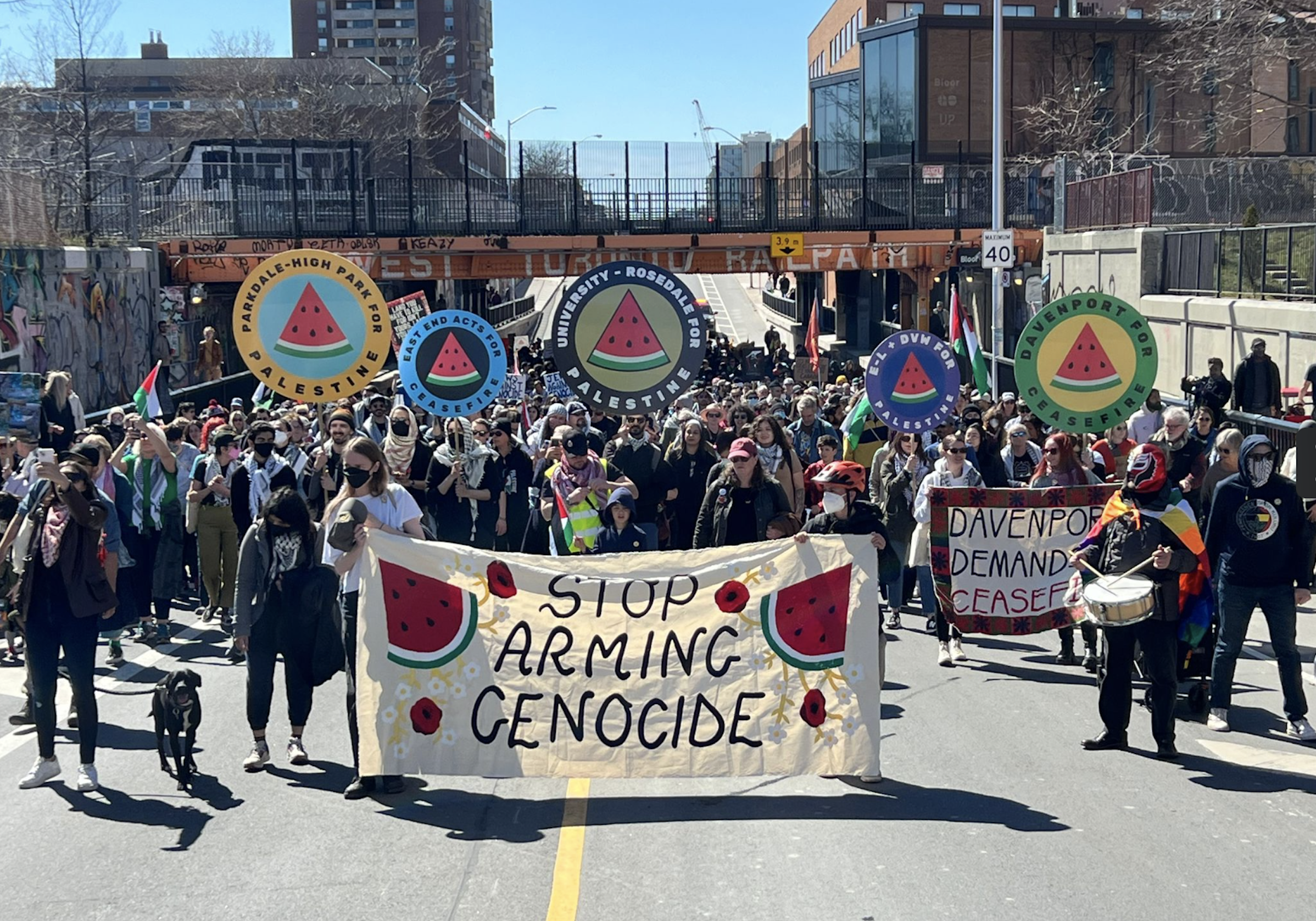
On April 7, 2024, thousands of people marched with different neighbourhood grassroots groups to demand an arms embargo, a "free Palestine" and an end to what the International Court of Justice has deemed "plausible genocide."

Beyond protesting, Davenport for Palestine hosts weekly group therapy sessions, book clubs and community meetings to create a space where neighbours can check in with each other and discuss organizing.
It’s also been running Davenport Aid Brigade, a direct aid group with other neighbourhood groups through which organizers collect donations for humanitarian and medical supplies. On June 27, Noora Mahmoud, a member of the aid brigade, flew to Cairo and started delivering money, medicine, gauze, clothing, vitamins and baby formula to Palestinian families who’d fled Gaza. Through word of mouth, Mahmoud has been meeting and vetting families. She usually sets up an initial visit to get to know the people, learn more about their needs and allocate resources.
But after doing the work for a few weeks, she now wants to connect people in Toronto who are donating, to the people in Cairo who are receiving the donations, so they can forge friendships and community directly over video calls and texts.
“One of the most important things that I really learned is the absolute beauty, the kindness, the caring, the love of these people who have been through so much,” Mahmoud told The Green Line. “I do want to bring that side of it to people in Canada.”
She adds it’s crucial that people outside of Gaza can get to know Palestinians beyond pictures of injuries and death through their phones. “That's very, very important, so that we see it less as charity and more as solidarity and understanding.”
"One of the coolest aspects of this situation is that we're able to connect the global to the local."
FLORENCE SOFFIA
DAVENPORT FOR PALESTINE ORGANIZER
Through all the activities it’s been facilitating, the Davenport group has emerged as a leader in helping other neighbourhoods in Toronto start their own groups by providing a “strong blueprint for continued community organizing,” according to Soffia. For example, the Toronto St. Paul’s for Palestine group was inspired by Davenport, according to Mohammed, a Palestinian-Canadian management consultant living in the neighbourhood who wanted to go by his first name only for safety concerns.
Mohammed’s involvement in the group began out of his desire for a community where he could “share, complain and help each other.” In October 2023, Mohammed was feeling alienated by local politicians and broader Toronto society — a feeling he says he was familiar with as a Palestinian immigrant, who in 2008 witnessed racist and Islamophobic discourse from Stephen Harper’s government, and in 2021, was disappointed with the response of Justin Trudeau’s government to another one of Israel’s attacks on Gaza.
This time around, Mohammed and his wife found comfort in WhatsApp groups made up mostly of Palestinian-Canadians who were trying to process the attacks since October 2023 together. The community started with some online activism, which included sharing petitions and raising awareness through social media posts; soon after, it evolved into in-person meetings. When Mohammed saw the protests in Davenport, he was impressed by how well-organized the group was, and knew he wanted to do more in his own neighbourhood.
In November 2023, he connected with Soffia to learn how to replicate Davenport’s grassroots model. Today, Toronto-St. Paul’s for Palestine has 60 core members who actively plan events within specialized subcommittees. For example, a communications committee is responsible for social media content, statements and petitions; a strategy committee handles research on local government representatives; and event committees host community gatherings. The group now has close to 600 total members who participate in these actions, according to Mohammed.
“There are many people in the riding who are eager to volunteer and support,” he says. “It's always good to start small, establish trust and then set up ways to grow the group.”
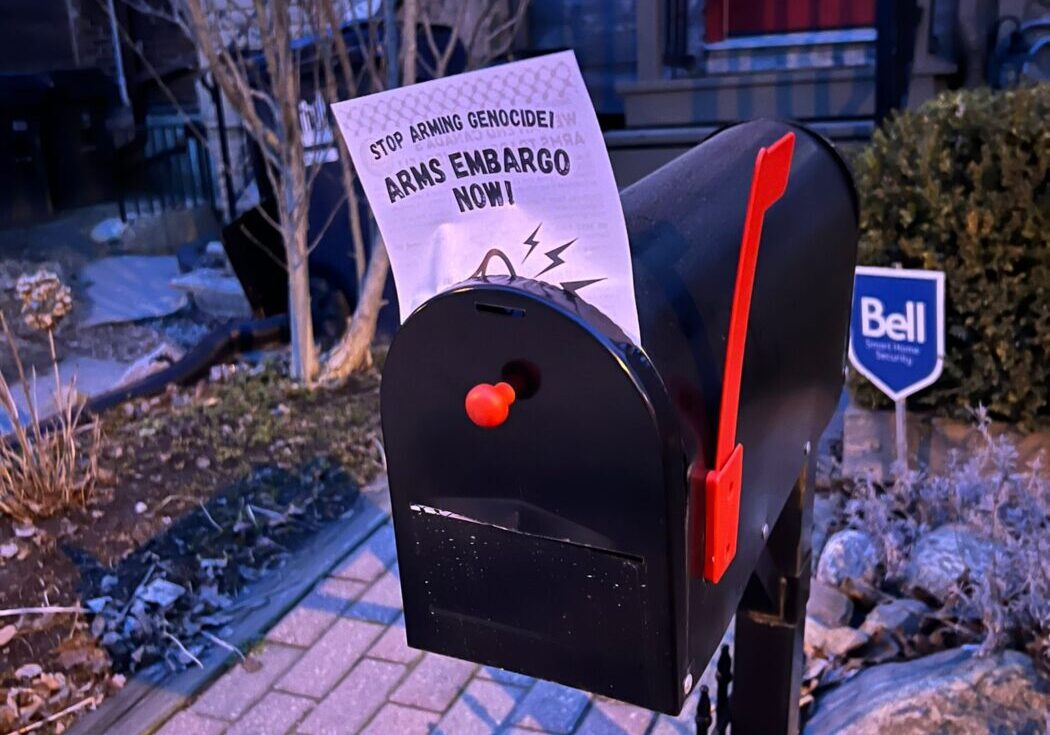
Activists from Davenport for Palestine delivered flyers to local homes to share more information about their demand for the Canadian government to implement an arms embargo for Israel.

While most ridings were pressuring their MPs to support an arms embargo and a ceasefire, the organizing in Toronto-St. Paul looked different. Its MP Carolyn Bennett had resigned in early December 2023, leaving constituents with no representative to turn to. So, the group’s strategy shifted to pressuring the candidates who were running for the by-election held on June 24. Although Toronto-St. Paul’s for Palestine didn’t endorse a specific candidate, they highlighted which candidates were more empathetic towards their cause.
“We wanted to increase awareness about Palestine, and make it an election issue connected to the constituents locally,” Mohammed explains, adding that he believes a politician’s recognition of Palestinian human rights says a lot about their general values. “If we're not consistent in our standards of human rights, then we will be marginalizing someone, and vilifying someone in our community here.”
For weeks in June, volunteers visited the neighbourhood’s busiest areas, including the Yonge and Eglinton and Yonge and Davisville intersections, the Davisville Farmers Market and St. Clair West subway station, to talk to local residents and encourage them to sign a voting pledge that stipulates constituents wouldn’t vote for “any candidate who fails to condemn the decades-long injustices perpetrated by Israel against the Palestinians, including ethnic cleansing, occupation, apartheid, denial of self-determination and what was recently deemed by the International Court of Justice as plausible genocide in Gaza.”
By the time of the by-election on June 24, the pledge had received over 550 signatures, both online and on paper. Ultimately, conservative candidate Don Stewart won the seat, which had been held by Liberals for more than 30 years. Stewart has called himself a strong ally of Israel, posted a picture of a pro-Palestinian protest with the tag #antisemitism, and described the protests as “hate-filled” and “calling on the death of others.” Although Toronto-St. Paul’s for Palestine was disappointed, going forward, the group says it still plans to sway future municipal elections, and will pressure Stewart to vote for a ceasefire and arms embargo.
Despite not seeing the outcome he wanted, Mohammed says his faith in his community has been restored. Most residents of Toronto-St. Paul are not Arab, Muslim and Palestinian, he explains, so his initial feelings of loneliness and betrayal after Israel’s attacks on Gaza are slowly dissipating.
“We live in a community that we want to be part of,” he says. “So it is extremely refreshing and extremely encouraging to see people from all walks of life, from all orientations, from all age groups, come and not only join a mailing list. No — they are active. They're putting in time, effort and money.”
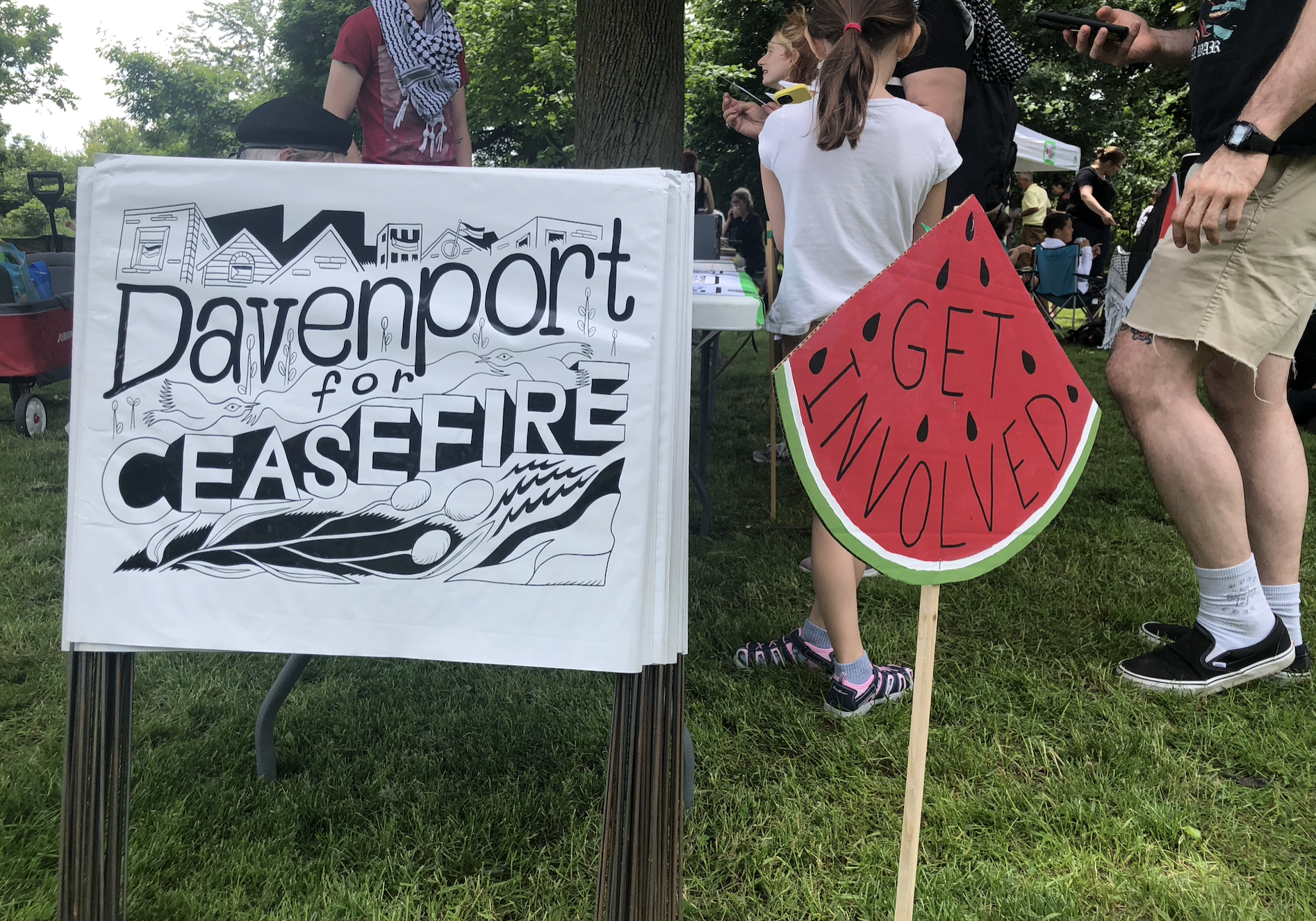
Organizers from Davenport for Palestine set up an information table during a picnic in Earlscourt Park to encourage community members to get involved and display solidarity with the pro-Palestinian movement.

DISRUPTIVE DIRECT ACTIONS
While the Toronto neighbourhood groups organized around electoral ridings focus on local politics, family-friendly actions and community events, other grassroots groups are taking direct action by targeting companies and embassies they consider complicit in Israel’s actions.
For months, local and national coalitions have tried to disrupt institutions and companies that support Israel politically, financially or through weapons sales. For example, World Beyond War Canada, an organization that describes itself as “a global movement to end all wars,” and the Palestinian Youth Movement (PYM), a pro-Palestinian, anti-Zionist, socialist and anti-imperialist group, have shut down local locations for companies that provide or ship parts or weapons to the Israeli military. Most recently on June 12, PYM blocked Maersk offices in Mississauga to demand an end to the transportation of weapons and weapons components. Earlier this year, on Feb. 26, activists blocked the TTM Technologies factory in Scarborough because it supplies circuit boards to Israel for fighter jets and targeted missile systems.
Activists have also disrupted popular public events, most recently the Toronto Pride Parade. On the evenings of June 28 and 29, Queers for Palestine Toronto, Jews Say No to Genocide and Labour for Palestine took part in the Dyke and Trans marches along Church Street under the slogan “No Pride in Genocide.” On June 30, the Coalition Against Pinkwashing put a halt to the main parade, a decision it says it came to after Pride Toronto refused to meet over demands that brought forward multiple intersecting causes. The activists pointed out that corporations and banks participating in the parades have projects or investments that benefit the Israeli military.
For example, pro-Palestinian activists have criticized national Canadian banks for investments in weapons manufacturers that sell arms to Israel. Notably, Scotiabank has come under fire for investing near $500 million in Elbit Systems, an Israeli manufacturer that produces drone technology and mortar munition used in Gaza, the West Bank and south Lebanon.
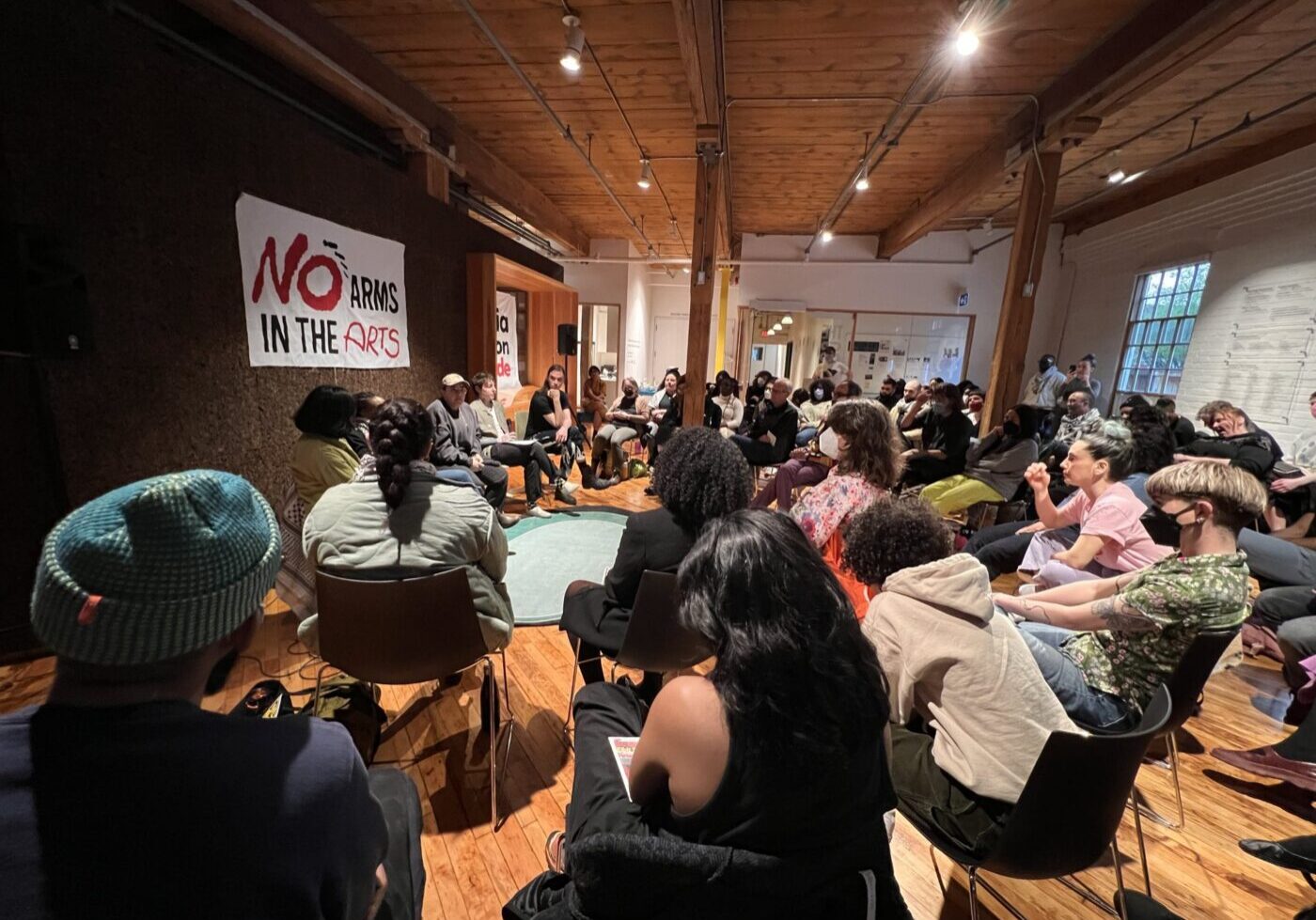
On April 30, 2024, the No Arms in the Arts festival organized a roundtable discussion on building international solidarity in anti-colonial organizing with members from the Sudan Solidarity Collective, Jews Say No to Genocide and Queers 4 Palestine.

Cultural Resistance
Toronto-based artists are also coming up with creative ways to protest the fact that many local cultural institutions are funded by the same banks that invest in these weapons.
One example is the No Arms in the Arts festival, a counterprogram scheduled to challenge Toronto’s iconic Hot Docs Festival, whose main sponsor is Scotiabank. Instead of boycotting Hot Docs, the community of artists behind the campaign decided to offer alternative programming to ask Hot Docs to reconsider its partnership with Scotiabank, and to demand that Scotiabank divest from Elbit Systems.
“Hot Docs is an institution that has given me opportunities as a documentary filmmaker, but this is the year when I felt least seen by them,” says S.H.A, who’s also part of No Arms in the Arts.
She adds that the counterprogramming, which offered screenings, teach-ins and panels from April 25 to May 5 in parks, pubs and screening halls across Toronto’s west end, aimed to fill in gaps in representation in Hot Docs’ programming. Ultimately, organizers say more than 400 people attended the festival.
“I was shocked at how well it was attended, how much there's a thirst for Palestinian voices, which are being silenced by the Canadian media and cultural sector” S.H.A. adds.
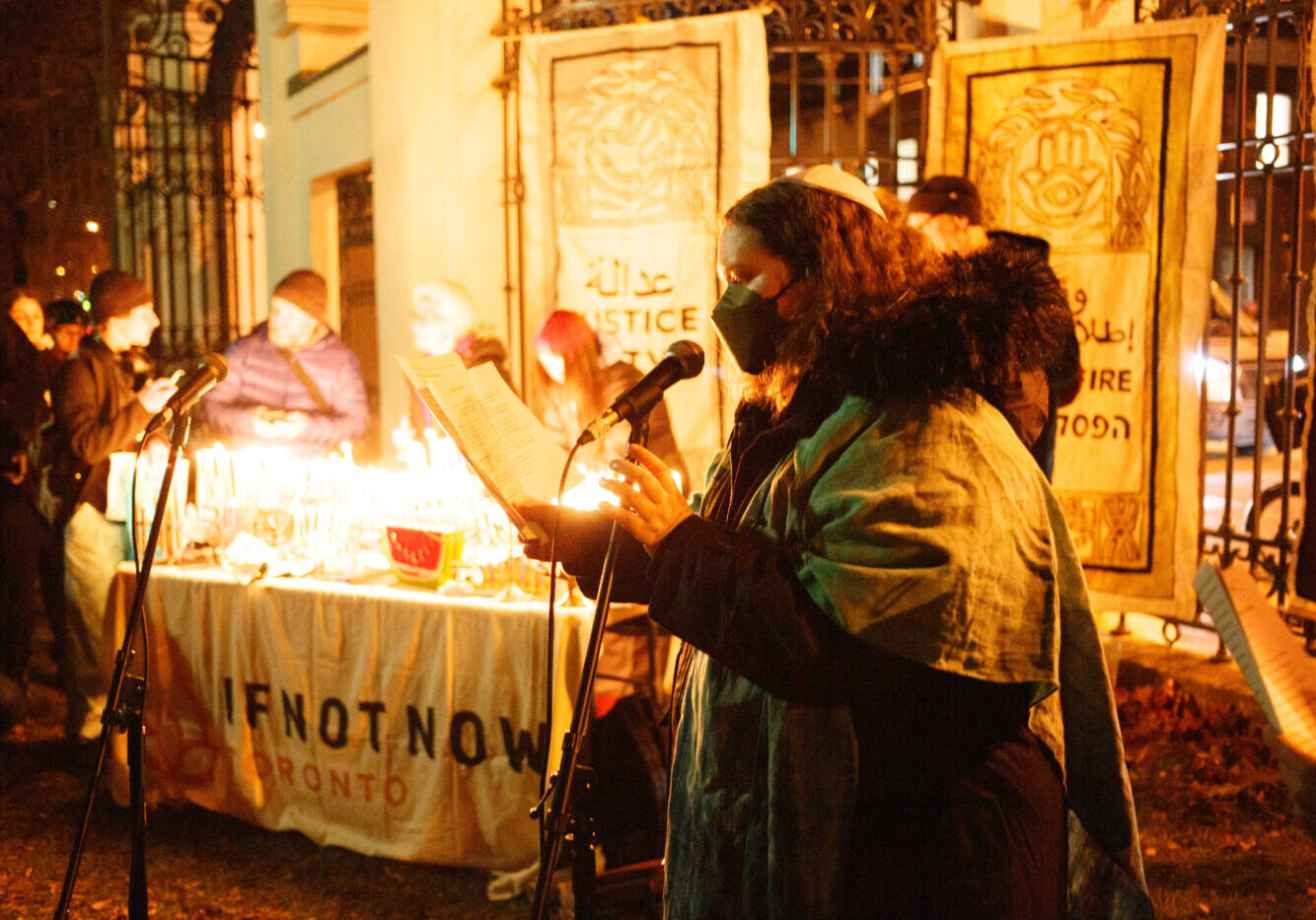
On Dec. 14, 2023, IfNotNow Toronto came together with over 300 community members to light candles for Chanukah, prayed for Palestinians who were injured, displaced or held captive by Israel, and for the Israeli hostages in Gaza.

Jewish Solidarity
Over the past nine months of organizing, Toronto’s movement for Palestinian liberation has brought together diverse communities, from queer coalitions to Kashmiri activists. One notable intersection playing out in Toronto has been the Jewish-Palestinian solidarity movement.
For example, the Independent Jewish Voices Canada (IJV Canada) was established in 2008, and has organized around many themes, including a campaign to end what it describes as Israeli apartheid.
Since October 2023, IJV Canada has joined marches calling for a ceasefire and arms embargo. It also participated in a regular “encampment shabbat” at the student encampment at University of Toronto’s St. George campus, which lasted more than 60 days and was eventually dismantled on July 3 following an injunction order from the Ontario Superior Court of Justice.
While IJV Canada revolves around direct solidarity with Palestinians, other groups such as IfNotNow Toronto centre the Jewish community’s own stakes in the movement. A media liaison describes IfNotNow Toronto as a local chapter of a movement based in the United States that provides a big tent Jewish organizing space to work together “to end North American support for the occupation, apartheid and genocide that the state of Israel is carrying out under the pretense of providing Jews around the world somewhere they can be safe.”
Founded in 2017, IfNotNow Toronto focuses on community-building and providing a space where members can build a safe and supportive Jewish community with the shared value that their safety is linked to the safety of other communities, according to organizers.
“As Jewish people, we have a stake in this,” co-founder Jonathan Brown Gilbert says, adding that he and other Jewish activists feel Israel’s attacks on Gaza betrays their religious values. “It's horrifying to us to see our community leaders, families and synagogues who have raised us with clear values around the sanctity of human life, justice above loyalty to any state, the dangers of ethnonationalism and how it's impacted our own communities — and to see those values betrayed.”
"As Jewish People, we have a stake in this."
JONATHAN BROWN GILBERT
IFNOTNOW TORONTO CO-FOUNDER
IfNotNow Toronto has been organizing events using Jewish teachings and traditions to help process collective grief, and denounce what it describes as Israel’s violent actions that are being carried out in the name of Jewish safety. On Nov. 2, 2023, IfNotNow held a 500-person vigil reciting the Mourner's Kaddish in Christie Pits. Then on Dec. 15, 2023, it organized a Chanukah for Ceasefire event in Trinity Bellwoods Park. This year, on April 30, it hosted a "Freedom for All" Jewish-Palestinian Resistance Seder in Nathan Phillips Square.
“It's given me this community that I've been longing for,” explains new member Marlee Wasser, who says the group provides her with the space not only to challenge Israel’s attacks on Gaza but also to honour Jewish traditions and preserve them outside of the framework of supporting Israel. “I don't know how I'd be getting out of bed, honestly, without a group like this.”
Wasser adds that IfNotNow Toronto has helped her process difficult emotions and conversations she’s been having with her own family and faith community around Israel’s actions.
While some Jewish activists in Toronto joined longstanding groups like IfNotNow and IJV Canada, others established Jews Say No to Genocide, a newly formed coalition of multiple local Jewish organizations, which engages in more direct actions. It organized protests and sit-ins at busy downtown Toronto locations to bring attention to Israel’s attacks and to demand a ceasefire. Member Chelsey Lichtman says organizing in Toronto is important to counter what she describes as “Zionist institutions [that] are prepared to dox and censor” protesters by conflating solidarity with Palestinians with antisemitism.
IfNotNow Toronto’s Brown Gilbert says the Jews Say No to Genocide coalition was created on Oct. 23, 2023 after the first collective action by Jewish groups for Palestine, which was a protest organized by members of the United Jewish People's Order (UJPO), Showing Up for Racial Justice (SURJ), IfNotNow, IJV Canada and World Beyond War.
“I've never seen a crowd that large of predominantly Jews coming out for Palestinians,” Brown Gilbert, who was also part of the coalition, says.
“Many of our pro-Palestinian allies and people within Jewish communities are interested in deepening their understanding of antisemitism. They know that criticism of Israel and expressions of anti-Zionism are often falsely labelled as antisemitic, but they haven't been provided with much analysis about how real antisemitism actually operates or how it's connected with other systems of oppression.”
“As a Jewish organization that's committed to Palestinian liberation, we are well-positioned to hold the nuance required for this kind of community education.”
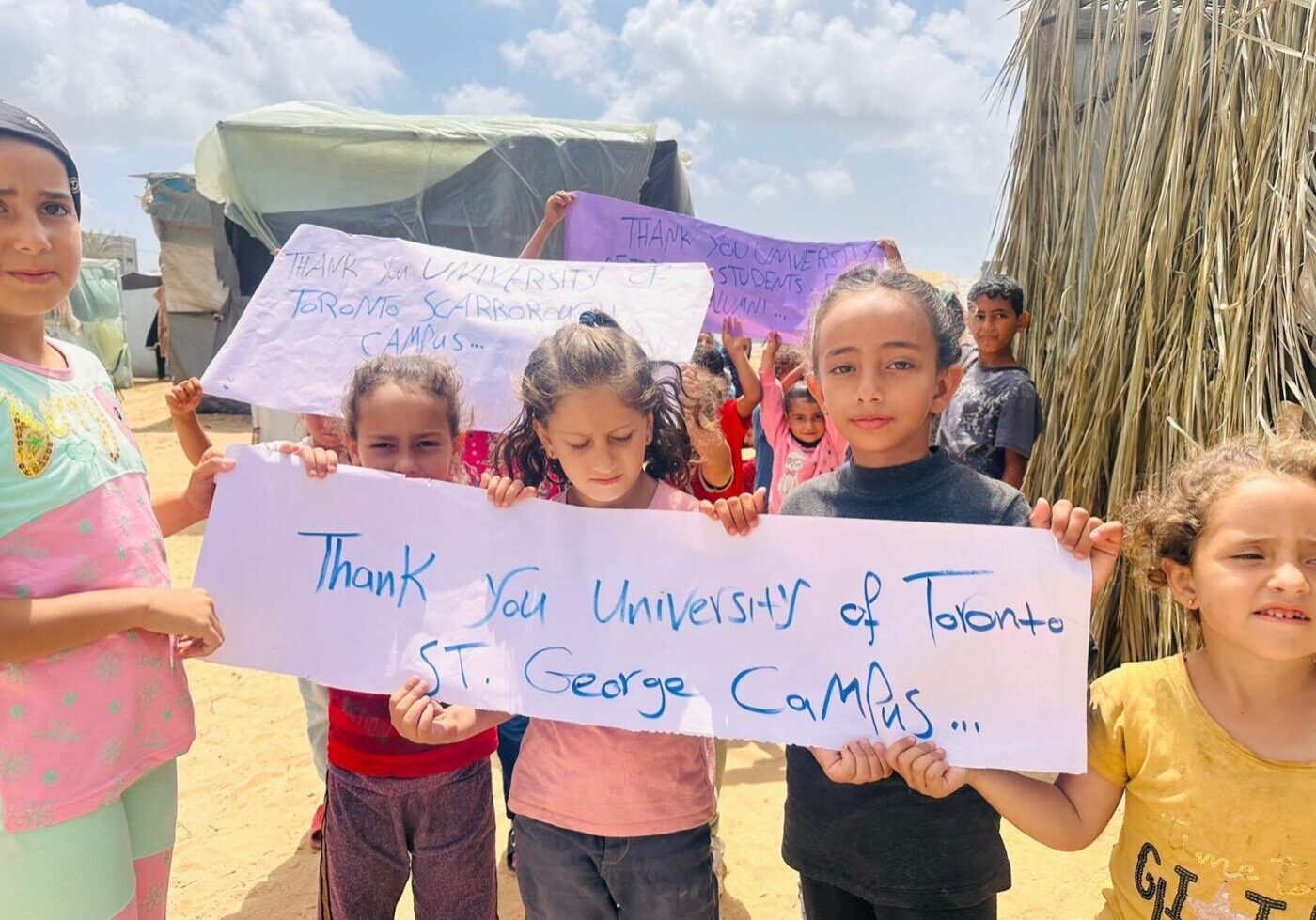
On May 6, 2024, an image circulated on Instagram and X (formerly Twitter) showing a group of young Palestinian children holding up a banner that reads “Thank you University of Toronto St. George Campus.” The banner refers to the student encampment that occupied a central lawn on campus to demand that their university divest from companies that facilitate the Israeli military’s actions in Gaza.
Community as a tool of resistance
Torontonians involved in the local pro-Palestinian movement agree that they’ve been able to score some small wins, from encouraging a local MP to vote for an arms embargo, to making a Canadian bank start to divest from arms manufacturers.
They also acknowledge some setbacks, including the forced dismantling of the U of T encampment. But ultimately, the activists believe this grassroots movement has left an important mark on the communities involved.
Palestinian-Canadian filmmaker S.H.A. says Palestinians in Gaza have even recognized these local actions from abroad. “We saw the picture of three girls in Gaza carrying a sign that said: Thank you U of T’s St. George Campus. They're naming our own hyper localities, so it means so much for us,” she says.
For M.B., a mother of two living in Davenport who only provided her initials to protect her and her family’s personal and professional safety, the grassroots movement in her neighbourhood has allowed her to “come out” as Palestinian to her community. “It has totally changed my interactions with my community and shown me that showing up as my true self — as someone who is Palestinian — is one of the most important acts of resistance I can do in my daily life,” she explains.
As an educator, M.B. believes that learning is social, and that we develop knowledge and empathy by engaging in community events. That’s why she’s prioritized participating in activities where she could bring along both her children and older relatives, such as a picnic held by Davenport for Palestine on June 8.
"But now, I do see myself in the city, specifically in these counter-spaces and spaces of community....It’s been amazing to be part of this grassroots movement."
S.H.A.
PALESTINIAN-CANADIAN FILMMAKER
Soffia, the Davenport for Palestine organizer, says she’s met many people who were in desperate need of community, and who were struggling with feelings of loneliness and lack of safety. One member of the neighbourhood confided in her that she was planning on moving out of Toronto because she felt alienated; but seeing “Davenport for Ceasefire '' lawn signs and participating in rallies made her realize that she could build community here, according to Soffia. “Something I focus on a lot is building community, which allows us to create more opportunities for organization,” she says.
For Lichtman, encampments, protests and streets with lawn signs are where she feels the safest. “I know that all of the people here are strong believers in liberation for all, and I know that my safety as a Jewish queer person is wrapped up in safety for all other marginalized and oppressed people,” she explains.
Every organizer The Green Line spoke to told us that the entry point for and the main goal of their activism was to stop the attacks on Gaza, but that a welcome byproduct has been the community they found.
“We do what we can in this moment to help people in Gaza feel like they're being supported and we do what we can to get our governments to not materially support what's happening [the assault],” IfNotNow Toronto member Wasser says.
“At the same time, we're building the capacity to take care of each other here in Toronto, which is very much needed for the way the world is going.”
Fact-Check Yourself
Sources and
further reading
Don't take our word for it —
check our sources for yourself.